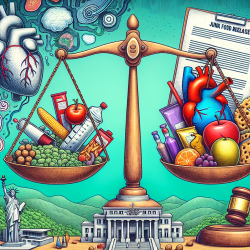The challenge of regulating the junk food industry in Latin America is a complex issue that intertwines political, social, and economic factors. A recent study titled "Getting to the root of the problem: the international and domestic politics of junk food industry regulation in Latin America" offers a comprehensive analysis of these dynamics. As practitioners, understanding these insights can significantly enhance our approach to therapy, particularly when addressing issues related to obesity and other non-communicable diseases (NCDs).
The Core Findings
The research highlights a critical gap in regulatory policies across Latin American countries like Brazil, Mexico, and Chile. Despite impressive prevention programs, only Chile has successfully implemented effective regulatory policies due to strong advocacy and supportive institutions. This success is attributed to what the study terms 'normative transferability,' where human rights principles are applied from NCD prevention to industry regulation.
Key Takeaways for Practitioners
- Understanding Normative Transferability: Recognize how transferring human rights narratives from prevention to regulation can lead to more effective policy outcomes.
- Role of Civil Society: Learn from Chile's example where civil society played a crucial role in advocating for regulatory policies through a rights-based discourse.
- Supportive Institutions: Identify and engage with institutions that can support advocacy efforts in your community or practice setting.
Applying Research Insights to Therapy
As therapists, we often encounter clients struggling with health issues exacerbated by poor dietary habits. By understanding the political and regulatory landscape of the food industry, we can better guide our clients towards healthier choices. Here are some practical ways to incorporate these insights into your practice:
- Educate Clients: Inform clients about the influence of marketing on their dietary choices and encourage critical thinking about food advertisements.
- Advocate for Policy Change: Join or support local advocacy groups pushing for better food regulations. Your expertise can lend credibility to these efforts.
- Promote Healthy Habits: Use therapy sessions to reinforce healthy eating habits and discuss the broader societal influences on personal health.
The Importance of Further Research
This study underscores the need for ongoing research into the political determinants of health. By collaborating with political scientists and public health scholars, practitioners can contribute to developing frameworks that address these complex issues more effectively.
If you're interested in delving deeper into this topic, I encourage you to read the original research paper. It provides a detailed analysis of how different countries navigate the challenges of regulating the junk food industry and offers valuable insights for improving public health outcomes.










